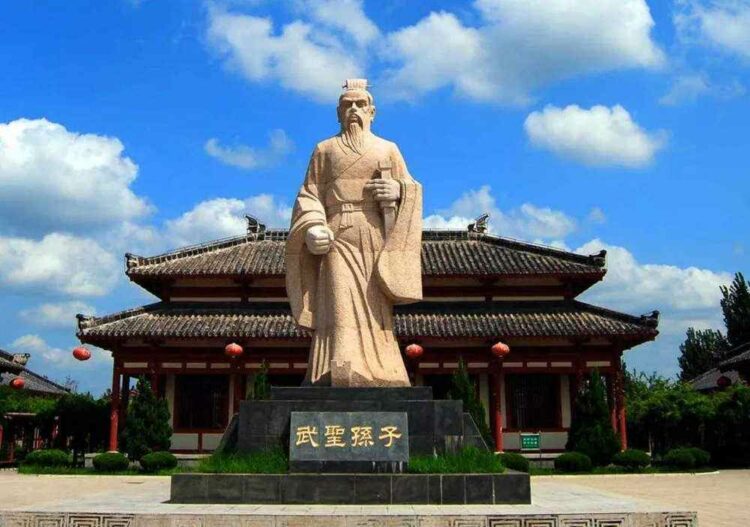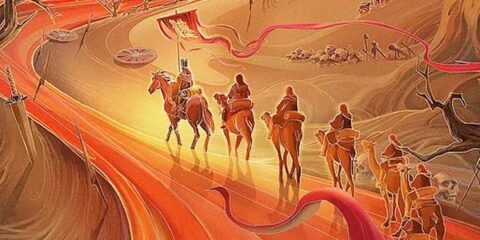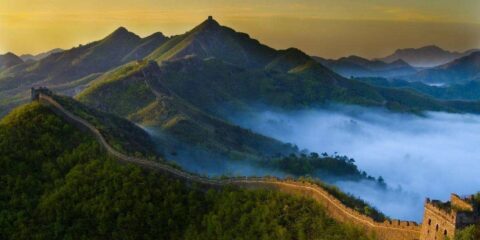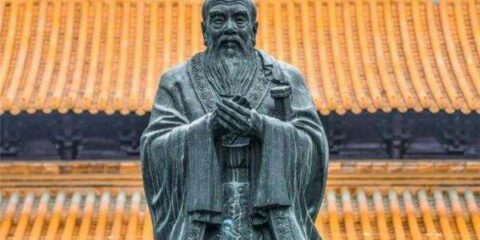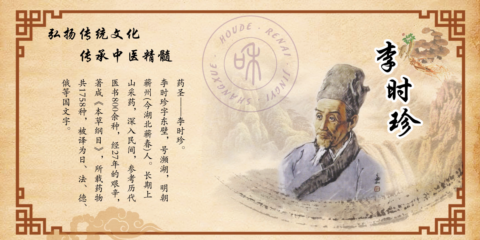| order | name | Historical time | status | consequence |
| 41 | Sun Zi | 544 BC-470 BC | It is named Sun Wu, known as “soldier saint” and “the division of hundred generations of strategists”. | Sun Tzu’s art of war, a masterpiece with 13 chapters, is highly praised by later military strategists and is known as the “military canon”. Its military thought, military system and literary language have had a far-reaching impact on later generations! Sun Wu’s military speech and thought have influenced famous generals and wars of all dynasties. This famous work has been popular all over the world in modern times. |
| 42 | Yue Fei | 1103-1142 | The national heroes of the Northern Song Dynasty and Han Dynasty are also the national heroes of the Chinese people in a narrow sense, which are almost well-known in China | For more than 800 years, his patriotism and unyielding sentiment have inspired countless Han people to serve the country generously for the suffering country. He and the great Yu, Li Shimin, Du Fu, Bao Zheng, Wen Tianxiang, Lin Zexu of the Chinese nation have all become well-known historical giants. |
| 43 | Tao Yuanming | About 365-427 | Poets, writers, poets and essayists in the late Eastern Jin Dynasty and the early Southern Song Dynasty | The originator of pastoral poets and the author of the peach blossom garden. Many people like and even learn Tao Yuanming’s life philosophy of sticking to the cold house, expressing his interest in the countryside and retreating to the mountains and forests, as well as his life style of diluting remoteness, tranquility, nature and transcendence. The influence of him and Yue Fei can be said to be one Wen and one Wu, one negative and one positive. |
| 44 | Yi Yin | About 1630 BC-1550 BC | Outstanding statesman and strategist | Yi Yin had outstanding political and military talents. He became the Prime Minister of several kings of the Shang Dynasty, laid a firm political foundation for the continuation of the Shang Dynasty for more than 600 years, and became the first famous prime minister in China’s history. Later generations respected him as a saint because he promoted the development of Chinese history, including the development of Chinese culture. |
| 45 | Cixi | 1835-1908 | Cixi was one of the few women who had been in power for a long time in the imperial era | She listened to the government three times, decided the crown prince two times, acted arbitrarily and carried the national pulse of the Qing Dynasty in her hands, which greatly affected the trend of modern Chinese history. Her stupidity and ignorance hindered China’s progress, her outstanding ability avoided China’s division and overall chaos, and she made China slide into the abyss of semi colonial and semi feudal. |
| 46 | Sun Simiao | 581-682 | They are called “medicine king” or “medicine saint” | He was a famous doctor and Taoist in the Tang Dynasty. He was known as the “king of medicine” or “saint of medicine”. Due to the great influence of Qianjin Yaofang and Qianjin Yifang, these two works are known as the Medical Encyclopedia of ancient China, which played a historical role of connecting the Han and Wei dynasties and the song and Yuan Dynasties. His Dan Jing recorded the formula of gunpowder for the first time and was one of the main inventors of gunpowder! |
| 47 | Zhou Dunyi | 1017-1073 | Philosopher and founder of Neo Confucianism | His Neo Confucianism thought played a role of connecting the past and the future in the history of Chinese philosophy, and had a wide impact on the academic in the next 700 years. Zhou Dunyi is the initiator of systematic discussion on the origin of the world as a philosophical issue. For example, the philosophical categories of infinity, Tai Chi, yin and Yang, five elements, movement and stillness, life, good and evil have become the research topics of later Neo Confucianism. |
| 48 | Xun Kuang | About 313 BC- 238 BC | Known as Xunzi, he is a famous thinker, writer and politician | Han Fei and Li Si are his disciples, but he is one of the representatives of Confucianism. Xunzi developed Confucianism, established the materialist thought of “man conquers nature” and advocated the theory of evil nature, which is often compared with Mencius’s theory of good nature. Xunzi was the first person to use fu and was called “the ancestor of Ci Fu” together with Qu Yuan. |
| 49 | Zeng Guofan | 1811-1872 | A historical figure with great influence in modern history | He founded the Hunan army and suppressed the Taiping Heavenly Kingdom movement, the largest peasant uprising in Chinese history and different from Chinese culture. He advocated the Westernization Movement. China’s first ship, the first military academy, the first translation and printing of Western books, the first batch of students studying in the United States, and so on went one after another. As a master of Confucianism, he deserves to be “the first perfect person in China through the ages”. |
| 50 | Yang Yan | 727-781 | Financial reformer in the Tang Dynasty, an advocate of two tax laws | He put forward the financial concept of “living within the limits of income” opposite to the principle of “living within the limits of income” after the Western Zhou Dynasty and put forward the two tax laws of capital and tax instead of the system of living within the limits of income and tax since the Western Jin Dynasty, which is an epoch-making measure. The two tax laws were used by future generations, which is a major reform of the tax and servitude system in Chinese feudal society and has a far-reaching impact on future generations. |
| 51 | Tang Xuanzong | 685-762 | Emperor of Tang Dynasty | He is a historical figure with outstanding merits and demerits. In the early stage of Tang Xuanzong’s reign, he placed great importance on virtuous officials, made great efforts to govern the country, and continued the development of social economy and culture, creating a “prosperous era of Kaiyuan” in Chinese history. However, in the later stage of his reign, he indulged in wine and lust, placed great importance on treacherous officials and political corruption, and finally broke out the rebellion of a Shi, which led to the decline of the Tang Dynasty. |
| 52 | Mozi | 479 BCE-381 BCE | The founder of Mohism in the pre-Qin Dynasty had a great influence on the history of Chinese philosophy and was called “outstanding learning” together with Confucianism“ | Its social ethics thought takes universal love as the core and opposes the concept of social hierarchy emphasized by Confucianism. Mohism basically disappeared after the Western Han Dynasty. Mozi was also a natural scientist. He created a set of scientific theories with great achievements. It is the thought of dialectical materialism and dialectical materialism, which has a certain influence in ancient times. |
| 53 | Emperor Guangwu of Han Dynasty | From 6 BC-57 | The founding emperor of the Eastern Han Dynasty | In the last years of Xinmang, after more than ten years of unification war, Liu Xiu successively destroyed many separatist regimes, which made the land of China, which had been in dispute and war for more than 20 years, unified again. After the world was settled, Liu Xiu implemented the national policy of “Yan Wu Xiu Wen”, developed production, and vigorously promoted Confucianism, thus laying the foundation of the later Han Dynasty for nearly 200 years. |
| 54 | Kublai khan | 1215-1294 | The grandson of Genghis Khan founded the Yuan Dynasty in 1271 | Mongolia and the Yuan Dynasty collected Yunnan and Tibet to achieve national reunification. Kublai Khan belittled the Han people and carried out national oppression. During his reign, Han law was adopted to establish various political systems. Set up provinces to create the end of China’s provincial system. The establishment of the Yuan Dynasty justifies the continuation of Chinese civilization! |
| 55 | Chiang Kai Shek | 1887-1975 | The main leaders of the party, government, and army during the Kuomintang Administration | Since Chiang Kai Shek followed the revolution led by Sun Yat Sen, after crusading East and West, he has nominally or formally unified China, which has been in a scuffle among warlords or anarchy. As the general representative of bureaucratic capitalism and feudalism, he carried out an armed struggle with the Communist Party led by Mao Zedong to determine the historical trend, which had a great impact in modern times. |
| 56 | Han Yu | 768-824 | Tang dynasty literati, thinker, and advocate of the ancient prose movement in Tang Dynasty | Su Shi in the Song Dynasty called him “the decline of the eight generations of literature”. People in the Ming Dynasty promoted him as the head of the eight families in the Tang and Song dynasties. He was also known as “Han Liu” together with Liu Zongyuan. He was known as the “great master of literature” and “Wenzong of hundreds of generations”. His prose achievements were outstanding and influenced later generations! Du Mu juxtaposed Korean with Du poetry and called him “Du poetry Han pen”. |
| 57 | Wang Xizhi | About 303-about 361 | Calligrapher of the Eastern Jin Dynasty, known as the sage of calligraphy | Its preface to Lanting is famous for thousands of years, and its composition is the first in ancient and modern times! Wang Xizhi’s calligraphy has influenced calligraphy from generation to generation. Many emperors and countless literati are also fascinated and worshipped, and continue to collect and learn, including fans such as Tang Taizong. In ancient times, the influence of calligraphy and painting was slightly inferior to that of literature, so it ranked behind Han Yu. |
| 58 | Jiang Ziya | 1128 BC-1015 BC | Jiang Shang, also known as LV Shang, is called “Yi Lv” together with Yi Yin“ | Jiang Taigong was the founder of the Zhou Dynasty and the founder of the state of Qi and Qi culture. Jiang Ziya was an outstanding strategist, strategist, and politician with a long influence in ancient China. His historical status was respected in ancient books. Confucianism, Taoism, law, military, and political schools all recognized him as a figure of his own family and respected him as a “master of 100 schools”. |
| 59 | Zhou Enlai | 1898-1976 | The success of China’s vigorous communist revolution in modern and contemporary times has a contribution that Zhou cannot ignore | He has made outstanding contributions to the success and charisma of the Communist Party of China, which is second only to Mao Zedong. The economy, people’s livelihood, stability, and diplomacy at the beginning of new China will not leave Zhou. Zhou Enlai is a modern replica of Duke Zhou and Zhuge Liang. |
| 60 | Han Xin | About 231 BC-196 BC | The founding hero of the Western Han Dynasty, an outstanding strategist in Chinese history, is a representative of the “war-seeking” School of Chinese military thought | Its way of using troops has been highly praised by strategists of all dynasties. Han Xin left a large number of tactical allusions for later generations, such as building plank roads in the open, crossing Chencang in the dark, carrying water for camp, attacking halfway across, being besieged on all sides, ambushing on all sides, and so on. It is said that Han Xin created chess and kites. |
Chinese historical figures are analyzed and listed in no chronological order as the top 100 most influential historical celebrities. Influence does not take into account who is famous, significant, outstanding, widely circulated or influential for a while, but rather which person in history has changed the course of Chinese history, the direction of development, people’s livelihood and economy, and way of life, and whether it has changed the outlook on life, values, the ideology of most people in history The history of China’s history is not just about the people, but about which person changed the course of history, the direction of development, the livelihoods, the economy and the way of life. For reference and study only!

